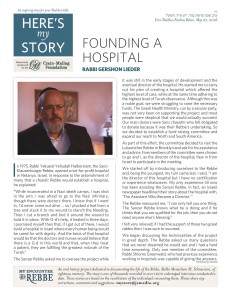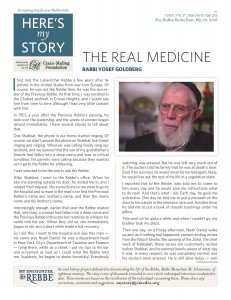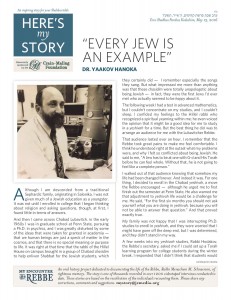Founding a Hospital
In 1975, Rabbi Yekusiel Yehudah Halberstam, the Sanz-Klausenburger Rebbe, opened a not-for-profit hospital in Netanya, Israel. In response to the astonishment of many that a Chassidic Rebbe would establish a hospital, he explained:
“While incarcerated in a Nazi death camps, I was shot in the arm. I was afraid to go to the Nazi infirmary, though there were doctors there. I knew that if I went in, I’d never come out alive … so I plucked a leaf from a tree and stuck it to my wound to stanch the bleeding. Then I cut a branch and tied it around the wound to hold it in place. With G-d’s help, it healed in three days. I promised myself then that, if I got out of there, I would build a hospital in Israel where every human being would be cared for with dignity. And the basis of that hospital would be that the doctors and nurses would believe that there is a G-d in this world and that, when they treat a patient, they are fulfilling the greatest mitzvah of the Torah.”
The Sanzer Rebbe asked me to oversee the project while it was still in the early stages of development and the eventual director of the hospital. He wanted me to carry out his plan of creating a hospital which offered the highest level of care, while at the same time adhering to the highest level of Torah observance. Although this was a noble goal, we were struggling to raise the necessary funds. The Israeli Health Ministry, run by a secular party, was not very keen on supporting the project and most people were skeptical that we would actually succeed. Our main donors were Sanz chasidim who felt obligated to donate because it was their Rebbe’s undertaking. So we decided to establish a fund-raising committee and expand our reach to North and South America.
As part of this effort, the committee decided to visit the Lubavitcher Rebbe in Brooklyn and ask for his assistance and advice. Five members of the committee were chosen to go and I, as the director of the hospital, flew in from Israel to participate in the meeting.
We started off by introducing ourselves to the Rebbe and, being the youngest, my turn came last. I said, “I am the director of this hospital but I have no certification or experience whatsoever. My only experience till now has been assisting the Sanzer Rebbe. In fact, an Israeli newspaper headlined their story about the hospital with, ‘The Assistant who Became a Director.’”
The Rebbe reassured me, “I can only tell you one thing. The Sanzer Rebbe knows what he is doing and if he thinks that you are qualified for the job, then you do not need anyone else’s blessing.”
I felt very relieved; if I had the support of these two great rabbis then I was sure to succeed.
We began discussing the technicalities of the project in great depth. The Rebbe asked us many questions that we never dreamed he would ask and I had a hard time answering. Only one member of the committee, Rabbi Shlomo Greenwald, who had previous experience working in hospitals was capable of giving the answers. We were greatly surprised by the knowledge which the Rebbe displayed and by his pragmatic approach. (more…)







